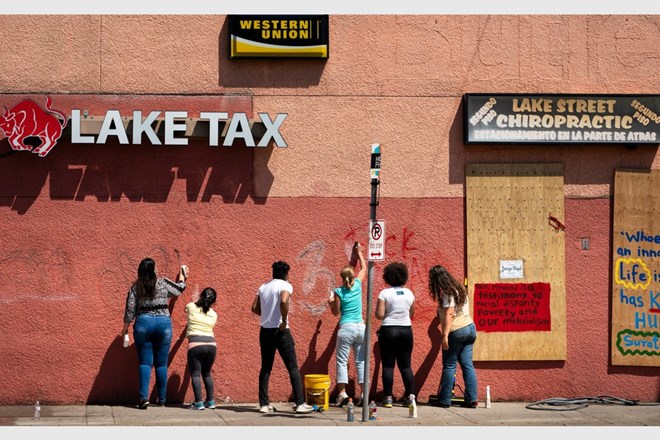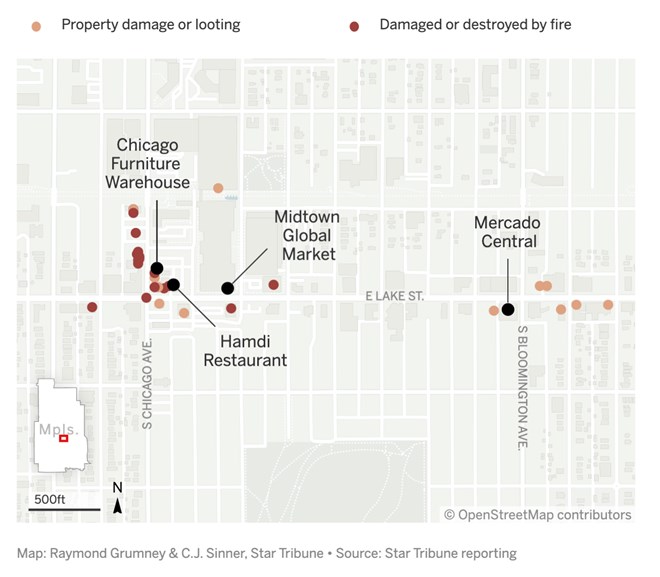
Thursday June 11, 2020
By Maya Rao
Between Interstate 35W and Cedar Avenue, Minneapolis had one of the most thriving hubs for new immigrant communities.

Gallery: A group of neighborhood volunteers cleaned the walls outside La Mexicana Grocery, one of the few operating grocery stores in the neighborhood.GLEN STUBBE – STAR TRIBUNE
When Faisal Demaag opened a store on E. Lake Street in the 1990s, many feared going to the Phillips neighborhood in south Minneapolis. It was rundown. Crime was high.
The Ethiopian immigrant persisted with his Chicago Furniture Warehouse. Slowly the neighborhood improved, as Mercado Central opened down the street and Midtown Global Market set up next door.
The stretch of East Lake between Interstate 35W and Cedar Avenue became one of the city’s most thriving hubs for new immigrant communities. Residents from Mexico, Somalia, Ethiopia and Vietnam built many of the businesses once owned by immigrants from Scandinavia and Greece who settled there in the late 1800s.
Now rioting has burned down many of these stores. Mercado and Midtown survived vandals and arsonists, but shopkeepers there still face losses. Many on this stretch of Lake are asking if the riots will roll back hard-won progress — and if they can persuade customers to return to an area that in some places resembles a war zone.
“Lake Street was reviving, the economy has been reviving, all these businesses were popping up,” said Demaag. “Now [the rioters] want to bring it back to the old days, when it was depressed.”Lake Street's Midtown grapples with future
Even buildings that remained intact are reflecting on their future as decades of revitalization were wiped out by arson and vandalism.
Chicago Furniture Warehouse - 2941 Chicago Ave - The warehouse was destroyed in the riots after more than 20 years on Lake Street.
Hamdi Restaurant - 818 E Lake St - Abdishakur Elmi's Somali restaurant was vandalized but escaped the fires that demolished several other businesses on his block. He is staying open.
Midtown Global Market - 920 E Lake St - Economic and cultural vitality began returning to this depressed stretch of Lake Street after it opened in 2006, but immigrant shopkeepers wonder if people will be afraid to return to Lake Street.
Mercado Central - 1515 E Lake St - Shopkeepers are still assessing the vandalism inside the Latino marketplace of 35 businesses that helped revitalize Lake Street after opening in 1997.

About six blocks away, shopkeepers at Mercado Central sifted through the damage done over the previous days. The Latino marketplace of 35 businesses was already struggling from COVID-19 closures, losing $100,000 in rent revenue, said general manager Eduardo Barrera. Now they were stepping over broken glass and shaking their heads over missing TVs and looted shelves.
When Mercado opened in 1997, Berrera said, “it was a place that sparked hope and a positive future for Lake Street, and ... several small businesses started to flourish and pop up along the corridor. So all of that work of the last 20 years is gone.”
But, he added, “We can do this again. We can have Mercado be again the catalyzer of economic activity, of hope.”
Some Mercado shopkeepers say they’re ready to start. “I don’t want to rush, but I want to open as soon as possible,” said Juan Olvera, as he surveyed his Dish Latino business, where thieves stole TVs and computers.
But Lucero Navarro, owner of Musica Y Novedades, was unsure about her prospects for reopening. Vandals stole all her valuable merchandise — “Todo,” she emphasized — and she said she lacks insurance and resources to cover her losses.
Midtown ‘a beacon of hope’
Some retailers and restaurants in Midtown Global Market are starting to reopen with the loosening of COVID restrictions, something the riots delayed by at least a week. While most restaurants are still only open for curbside pickup, delivery and counter service, Salsa à la Salsa opened with on-site seating Wednesday.
The iconic former Sears building, whose sign looms high over Lake Street, stayed intact with the help of neighbors, tenants and security guards standing watch night after night, though vandals broke doors and windows and stole some merchandise.
Yet with the surrounding area in shambles, Midtown is plotting an uncertain future. The dollar store to the east went up in flames, the bank to the south was destroyed, and Demaag’s business to the west sits alongside a burned-out cellphone shop and shoe store.
Midtown opened in the vacant Sears building in 2006, bringing life to the languishing stretch of E. Lake Street. The redevelopment, many years in the making, supported ethnically diverse entrepreneurs but faced an early economic hit with the Great Recession. It didn’t turn a profit until four years ago; now it houses businesses representing 22 nationalities.
Midtown had already faced challenges with construction around E. Lake Street that closed exits from I-35W. Then restaurants faced a monthslong shutdown during the pandemic.
“Most restaurants were operating with pretty thin margins already,” said Trung Pham, who owns one of the market’s earliest tenants, Pham’s Rice Bowl. He said he hopes Midtown can inspire recovery along Lake Street: “It’s like the shining star of the south Minneapolis neighborhood.”
Talking to residents of the neighborhood, Pham said, “You can’t miss the feeling that it’s like a beacon of hope for south Minneapolis, and they all felt if that building was to go, it’s like their neighborhood has gone along with that.”
Some leaders at Midtown are talking about using empty space for several more restaurant owners and retailers, especially pop-up establishments. More space was freed up last week after Midtown officials evicted Holy Land grocery and deli following racist social media posts by an employee.
Making it work
Raja Ziadi walked through the empty market last week, pointing out where thieves had left shattered glass and misplaced goods. “You see how many businesses are here?” she asked. “Lots of dreams.”
Ziadi and her husband, Hassan, opened Moroccan Flavors four years ago shortly after immigrating. Upon seeing the destruction of her neighbors’ shops on Lake Street, she said “we cry a lot and ... we cannot do nothing and they cannot do nothing.”
Business owners have had periodic Zoom calls with Midtown management, Ziadi said, “and the people are scared because all of us are immigrants. Everybody is scared and they say the market, it’s going to be very slow ...
“We have a lot of customers from Edina, from Minnetonka, from Woodbury, and now I think they’re going to be scared. How are they going to come to this street? Now everybody knows it’s a dangerous street.”
Demaag shares her sentiment: “People were afraid to come to the area,” he said, referring to the days before Lake Street’s revival. “What’s going to happen now?”
And he feels bereft by the loss of his store. “That’s my livelihood,” he said. “That’s all I have, our only income.”
Between Midtown and Chicago Furniture Warehouse, Abdishakur Elmi is keeping his Somali restaurant Hamdi going even though looters stole $9,500 in cash, smashed glass and damaged equipment. Like others on E. Lake Street, his calls to 911 for help were fruitless.
“We live in America,” said Elmi, who has done business here for 20 years. “Where’s the police? Nothing.”
Pham said there’s no question about the work ethic of Midtown’s immigrant business owners. But their biggest challenge now is getting capital to keep their stores open. He said he’s encouraged by messages and financial donations from friends.
“They have given me so much emotional and financial support that I feel like I cannot let them down,” said Pham. “And I have to try to make this work.”